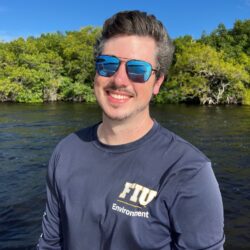Coastal Ocean Explorers: Sharks program sponsors were citizen scientists for a day, working alongside scientists from Florida International University to conduct shark research onboard R/V ANGARI.
EXPEDITION DETAILS
October 5, 2024
Palm Beach County, FL
Mia Gabb
Sophia Hemsi
Aedan Mell
William Sample
Davon Strickland
All sharks were fished for, caught, studied and released for research purposes under Florida permits held by Florida International University scientists.
The ANGARI Foundation Board of Directors welcomed sponsors and supporters onboard R/V ANGARI for a fun Coastal Ocean Explorers: Sharks expedition. The ANGARI crew and Florida International University scientists led the guests through a day of COE: Sharks, giving them the student experience firsthand, which involved fishing for sharks using specialized gear called drumlines and deploying baited remote underwater video system (BRUVS) to observe underwater marine life.
To kick off the day, the participants gathered in the onboard laboratory to learn about how scientists use BRUVS, a non-invasive research method, to observe and assess marine life species and populations, including sharks, in an area. After their lesson on BRUVS setup and deployments, the participants helped the research team assemble and deploy a BRUVS into the Lake Worth Lagoon. The BRUVS soaked for one hour, at which time it was retrieved and brought back onboard, and the vessel moved north to Blue Heron Bridge to continue shark research efforts in the northern waters of the Lake Worth Lagoon.
Once on site, FIU scientists assisted participants with setting up and deploying specialized research gear used to safely catch sharks known as drumlines. Deploying a drumline involves attaching bait to a circle hook, letting out the bait attached to a monofilament fishing line into the water, attaching and lowering a 50 lbs. weight into the water, letting out additional polyline and tossing a buoy to mark the drumline location on the surface. After a set amount of time, participants picked up and pulled in each drumline, checking to see if anything was hooked. During the expedition, a total of 21 drumlines were deployed over several hours and resulted in no sharks caught.
On our transit back to the dock everyone gathered in the lab to review the BRUVS footage that was collected earlier in the day, and everyone was very excited to spot a male nurse shark (Ginglymostoma cirratum) investigating the bait cage!
Although no sharks were worked up during this expedition, everyone onboard had a science filled and educational day out on the water where they got to experience the COE: Sharks program firsthand and shown how their support of the program provides new opportunities for and positively impacts local middle and high school students.
CHIEF SCIENTIST

Will Sample is a Ph.D. candidate in the Marine Community and Behavioral Ecology Lab at Florida International University. His current research uses both long-term historical datasets and newer methods, such as high-resolution accelerometry, to study the movement and behavioral ecology of juvenile bull sharks. He specifically focuses on the way these sharks may be transporting nutrients across habitat boundaries, how they may be optimizing their movements to save energy and what the long-term implications of different behaviors they specialize in may be. Will’s research in the Florida Everglades studying the ways sharks move through this crucial ecosystem is important for conservation and informing habitat restoration and management efforts. Will earned a B.S. in Liberal Arts and Sciences from Florida Atlantic University in 2018 and has lived all throughout Florida for most of his life, from Jacksonville to Jupiter to the Keys. He is passionate about community outreach and education, particularly regarding Florida’s natural habitats, and currently serves as lead scientist for ANGARI’s Palm Beach County based Coastal Ocean Explorers: Sharks program aboard R/V ANGARI.


